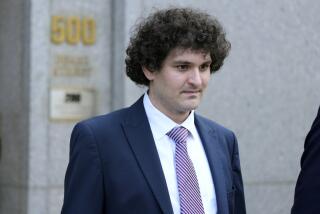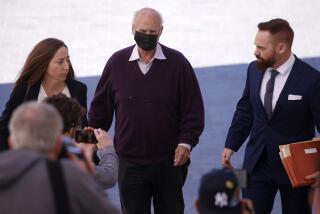Former Broadcom executive emerges intact from options scandal
Almost from its inception, the federal government’s options backdating case against executives of Broadcom Corp. reeked of cheap melodrama more than it gleamed with truth-seeking about corporate accounting and corporate pay.
You can count Bill Ruehle, the Irvine high-tech company’s chief financial officer during the period at issue, as one of the victims of the game. You should also know that Ruehle, 70, escaped with his reputation intact, and has lived to tell the whole story his way.
Ruehle was indicted in June 2008 on charges he defrauded Broadcom and its shareholders by failing to account properly for millions in stock option grants to company employees and executives. His fellow defendant was Broadcom co-founder Henry Nicholas, who was simultaneously but separately charged with a raft of lubricious misdeeds — drug use, hiring of prostitutes on a majestic scale, consumption of pot in such volume that the pilot of his personal plane supposedly had to wear an oxygen mask to keep straight.
The public and the press (including, truth be told, The Times), ate it up — right up until December 2009, when federal Judge Cormac J. Carney of Santa Ana tossed it all out for prosecutorial misconduct, also on a majestic scale.
“I think they wanted very badly to win,” Ruehle told me last week, referring to the feds, “and some people go over the top in their zeal to win.”
Ruehle sounds surprisingly serene about a process that placed his freedom and his reputation in jeopardy for the better part of 31/2 years, counting back to August 2006, when he first suspected that Broadcom might be setting him up as a fall guy. An angrier tone emerges from his recent self-published book, “Mr. Ruehle, You Are a Free Man: My Fight for Justice.” (The title comes from Carney’s final words upon tossing the case.)
In the book, Ruehle trains his anger on two targets: the federal prosecutors who trampled on his due-process rights and the paltriness of the options scandal, which he contends was ginned up by the business press and by regulators looking for easy scores. Backdating didn’t involve much wrongdoing, if any, he contends, and surely didn’t rise to the level of criminal activity. On the first count, Ruehle is certainly correct; on the second, maybe not so much.
The options scandal erupted in 2005, when Erik Lie, a business professor at the University of Iowa, released a paper suggesting that hundreds of companies might have backdated stock option grants to maximize the potential gains for recipients, including top executives.
When options are granted they’re assigned a “strike price” at which they can be exercised, typically the stock price on the record date of the grant; when the stock rises higher than that price, the recipient can exercise the option and pocket the difference. If a grant date can be selected after the fact to establish a low strike price, the recipient can often be guaranteed a bigger score.
It’s not illegal to backdate an option this way. But grants of “in the money” options — those with an embedded profit on the grant date — must be recorded on corporate reports as a charge against earnings. Typically, the backdating cases turned on failures to account for them accurately in corporate disclosures.
Lie’s paper triggered an investigative frenzy. Backdating was fairly easy for the public to grasp, and the Securities and Exchange Commission and the Justice Department charged dozens of companies and executives with having failed to make the proper disclosures or falsifying corporate documents to conceal the grants’ true timing.
Broadcom, a rapidly growing tech company, had salted its executives’ and recruits’ pay packages with millions of option grants, making it a big target for the feds. In 2007, the firm restated six years of results to reflect $2.2 billion in previously undisclosed options expenses, the biggest such restatement up to that time.
Ruehle acquired the mind-set of an innocent man whose life falls under the control of utter strangers. “As a CFO I’d always been very conscious of the need to report to investors in a clear, straightforward and wholesome way. To suddenly have all these fingers pointed at you saying, ‘You’re a criminal,’ was frightening. The indictment read, ‘United States of America v. William Ruehle’ — I thought, that’s 300 million to one. That doesn’t sound like very good odds.”
Co-workers he thought were his friends — indeed, the company he had served — were now on the other side. He had cooperated with the internal investigation conducted by Broadcom’s law firm, Irell & Manella, on the assumption his conversations would be protected by attorney-client privilege, only to discover that the firm had fed the information to the prosecutors. Carney ruled it inadmissible, a first glimmer that the judge might be looking askance at the prosecution.
Would the jury understand Ruehle’s defense that options reporting principles were vague and that he was trying to reflect them on the corporate books as fairly as possible? “I was always hopeful the jury was paying attention, but I was never certain they were going to get it,” he says. “But in a case like this you don’t dare let your hopes get too high — there’s too much at stake.”
He tried to maintain a normal lifestyle — four months after his indictment, he married his second wife, Julie, a former Broadcom internal auditor. That brought him twin stepdaughters, age 8, to whom he and Julie had to explain that he had been accused of making a mistake.
Lawyers for Ruehle and Nicholas raised the alarm about the prosecutors’ behavior just before the start of trial. In asking that the case be dismissed, they complained that, among other things, the government had coerced Nancy Tullos, a former Broadcom human relations executive, into testifying for the prosecution by applying pressure on her subsequent employer, causing her to lose her job.
Carney initially shrugged off the complaints. Yet when Tullos eventually took the stand, the judge observed that her testimony “came off scripted and not consistent” with the documentary record. He eventually ordered it stricken in its entirety.
Days before the criminal case was to go to the jury, Carney ruled that Ruehle and Nicholas had been denied any chance at a fair trial, in part because of the government’s coercion of Tullos and similarly excessive pressure exerted on former Broadcom general counsel David Dull, who had been threatened with perjury charges if he testified in Ruehle’s defense.
The judge dismissed the criminal cases and SEC civil charges against both defendants, tossed the Nicholas drug indictment and overturned the guilty pleas of Tullos and Broadcom co-founder Henry Samueli, whom Carney found had been hounded by the prosecutors into pleading guilty to a crime he had not committed. He also ended SEC cases against Samueli and Dull. Defendants 9, government 0.
“That’s when we exhaled,” Ruehle says.
Yet did that outcome invalidate the whole regulatory attack on options backdating, as corporate America argues? There’s evidence that regulators put important cases involving accounting irregularities on the back burner to go after the hot subject of options backdating. And it’s also true that by 2006, when the investigations began, Sarbanes-Oxley reporting rules had eradicated backdating anyway. A paper this year by law professors at New York University and the University of Michigan suggests that the government wasted precious resources on backdating cases, orphaning potentially more important investigations.
“It’s pretty clear they were chasing down a lot of smaller cases with potentially lesser impact toward the end of their cycle of investigation,” says Adam C. Pritchard of Michigan, one of the authors. “Accounting frauds, insider trading, Foreign Corrupt Practices Act — we don’t know what didn’t get investigated. But they only have so many attorneys.”
The options cases, on the other hand, did slake the public’s thirst for action. “They have greedy executives, dishonesty — that’s a combination that plays well both with Congress and certainly got a lot of attention from the press.”
The options cases were themselves selective and seemingly random. For example, Apple’s late chief executive, Steve Jobs, was never threatened with prosecution, despite evidence that he had known about his company’s backdating and had received some of the grants at issue himself.
There were successful prosecutions of other executives in connection with options backdating, including Brocade Communications CEO Gregory Reyes and Monster Worldwide Chief Operating Officer James Treacy, who both eventually did time.
Ruehle defends Broadcom’s options reporting by noting, “accounting is not an exact science.” This is true, but it’s not entirely random, either.
“Companies were playing fast and loose with the rules,” observes Peter J. Henning, an expert in white-collar crime at Wayne State University law school. “There’s no way you can say, ‘We’re backdating and that’s completely permissible.’”
At many companies, the backdating resulted in materially misleading profit and loss reports, and in a securities regulatory system where accurate disclosure is the goal, that’s a big problem.
Still, the financial reporting principles left some room for interpretation at the time, and it’s fair to say that the dating of option grants at Broadcom became very complicated for entirely innocent reasons. The practice may have risen to deliberate fraud at some companies, but it’s hard to put Broadcom in that category, especially since the government wasn’t claiming that its executives were primarily out to line their own pockets.
Remarkably, Ruehle emerged from his trial by fire uncynical. “I came away with the feeling that that system is imperfect,” he says, “but not the feeling that it’s horrible and needs wholesale changes. It depends so much on individuals, and maybe some individual prosecutors got overzealous. But the truth came out, and the judge saw it.”
Michael Hiltzik’s column appears Sundays and Wednesdays. Reach him at mhiltzik@latimes.com, read past columns at latimes.com/hiltzik, check out facebook.com/hiltzik and follow @latimeshiltzik on Twitter.







